Jan Carson's Blog, page 3
August 25, 2019
Four Weeks in a Field


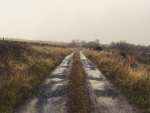


For the last four weeks I’ve been living in a converted shipping container in a field looking over Loch Long in Scotland. I have sheep on one side of my bedroom, highland cows behind me and, every evening between sundown and midnight, a flock (?) of tiny bats who swarm above the surface of my own front pond. Idyllic is an understatement. (The nightly plague of toads is the only part I could do without. Oh, and the mouse-sized spider who hangs above my bed).


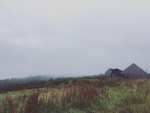


I’ve been staying here at Cove Park as part of their incredible artist in residence scheme. Being given time to write is an absolute blessing. Being paid really generously for the time to write is even more miraculous. It means worries about paying the bills back home can be put to the side and I can entirely focus on your work. Being paid and trusted to use my time wisely without having restrictive stipulations or goals placed on my work has proven to be the most freeing and encouraging thing that’s happened to me since I first started writing seriously fifteen years ago. There certainly hasn’t been a point since publishing Malcolm Orange Disappears five years ago, when I’ve been this free to write without worrying about where my income is coming from.
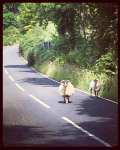




Like most “full-time” writers I’m used to squeezing my writing into the margins of my life. I juggle dozens of small jobs which pay the most pressing bills whilst trying to carve out a couple of hours daily in order to keep the next book ticking over. I don’t get to experiment much with my writing. I don’t get to try things just to see if they’ll work. I have projects and goals and deadlines; some self-imposed, mostly dictated. I love what I do and I remain thankful for the fact that my job is something I actually enjoy spending time working at, but if I’m honest, recently writing has often felt like a never-ending To Do list of projects which need finished and articles I have to write and edits which require attention. I haven’t had that much space lately to write for fun. I simply haven’t had any time.
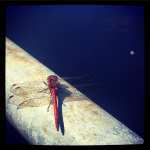
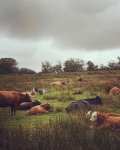



I arrived at Cove Park a little intimidated by the prospect of so much unstructured time. I’m so used to being productive and social and goal-orientated and a little bit anal, I wasn’t sure that I’d be able to relax. I had a couple of small projects which needed attention. But, for the most part, my plan was to rest, read and write whatever took my interest. I was pretty sure I’d be climbing the walls by the end of week one. I think most people who know me well had similar expectations. Well, it might have been the isolation, or the lack of internet or the incredible scenery outside my window. It might even have been the torrential rain. But I’ve found it much easier to relax than I’d anticipated. I’ve slept eight hours a night every night for the last four weeks. I’ve read thirty two books. I’ve walked two hours each day, (I’ve walked so much down puddly roads and through muddy fields, I’ll be leaving my ancient Nikes here in the bin at Cove Park. There’s hardly anything left of them). I’ve swum outside in lochs and pools. I’ve slept a lot, (did I mention sleeping?) and I’ve been hideously anti-social. (I have not missed any episodes of Holby or Casualty though. I am not a lunatic. I know where my limits are).





To my great surprise, I have also managed to be productive. I’ve written four new short stories, a couple of articles and fifteen thousand words of a novel, (which was terrible and almost instantly binned, though it did indirectly lead to a short story). I also allowed myself three weeks space to read and think about Dementia, allowing myself to process through the experiences I’ve had over the last number of years working with people living with Dementia. When I applied to Cove Park for the residency I’d mentioned how much I’d like space and time to respond creatively to my Dementia practice.



This time last week I was reasonably certain I’d have to tell lovely Rebecca, (who looks after the writers here at Cove Park), “do you know the way I said I’d like to write a creative piece about Dementia during my residency? Well, I never got past the research stage.” I’m pretty sure Rebecca would have been absolutely ok with a month spent researching. Here, they seem to trust that their artists know their own process best. However, on Monday I woke up with the beginnings of an idea I knew I had to start writing into. I have been frantically scribbling all week, pouring over the notes I’ve taken since arriving at Cove, playing with form and structure, taking long thinking walks over the high road, (which has the best views but the noisiest sheep) and basically trying to work out how to express the words and thoughts of a person living with Dementia.



Bizarrely I seem to have written a play. This was not my original intention. I was thinking I’d end up with linked short stories or something more like the Postcard Stories. However, I’ve never before written anything so adamant that it had to be written in a certain form. Ultimately, it couldn’t have been anything but a play. I’m really excited about what I’ve written and the opportunity it will afford me to collaborate with a couple of artists I’ve been dying to work with for a very long time. I’ve already made plans to get the ball rolling as soon as I get back home. Watch this space for further developments.


I feel like Cove Park has allowed me the freedom to experiment outside my comfort zone. Under normal circumstances I would most likely have rushed the creative process and not allowed the ideas enough room to breathe. I would have written a short story or a piece of prose in my usual style. I know arts funding is tight and residencies like this are incredibly rare but I want to make the case for Cove Park’s combination of trust, freedom and proper support as the absolute best way to ensure artists get the most from a residency experience. When you feel like the people supporting you trust you to make the best use of their support it actually leads to more freedom and creativity. Honestly, this month has completely rejuvenated me.
June 28, 2019
Ten Small But Significant Ways To Make A Writer Feel Really Uncomfortable At Your Book Festival
[image error]
So, you’re hosting a book festival/reading/literary event of some ilk and you’d like to invite some of your favourite writers. Follow these ten handy tips to be absolutely sure they don’t come back again next year.
Approach your writers with an introductory email, something along the lines of, “hello, I’ve read your book. It is great. Will you come to my festival?” Do not mention money in this email. Mentioning money might appear vulgar. Instead, force the writer to ask if there is a fee involved. Writers really love having to ask if they’re going to get paid for their work.
Do not offer accommodation. Instead, expect your writers to get up at the crack of dawn, (even better, the night before), travel for eight-ten hours, perform, then travel home that evening. If pushed for accommodation say, “sure, you can sleep on the plane/train/Aircoach.” Writers are at their most creative when suffering from sleep deprivation.
Do not pick your writers up from the station/airport/ferry terminal. Instead, expect them to navigate the local transport system with all their books in tow. This is especially fun for writers when visiting a country where they do not speak the language. It is the sort of experience which generates “new material.” Point this out to the writers if they complain. Say, “sure, you’ll get a good story out of this, if nothing else.”
Expect your writers to do many, many interviews promoting their appearance at your festival. Schedule these interviews at the most inopportune moments; ideally on the phone, during particularly tunnelly train journeys. Email your writers regularly to say ticket sales aren’t going as well as you’d hoped, perhaps it is because the writers you’ve ended up with aren’t as famous as the writers you’d initially hoped to feature. Insist that your writers do even more interviews, push the event on their own social media platforms and create Facebook invites. Offer no extra money for these services. Instead, say, “it is raising your profile as a writer. You should be paying us for all this publicity.”
Make sure your moderator doesn’t actually read your writers’ books. It is better by far to interview someone based on a cover blurb and an Irish Times article hastily scrolled through five minutes before going on stage. Writers really love these natural, spontaneous interviews.
Make your writers walk for approximately a mile, upstairs from the Green Room to the stage, so they arrive in front of the audience out of breath and somewhat confused as to where they are. Make them read immediately, at length. Ideally shine huge spotlights directly into their faces.
Do away with the sofas and comfy chairs. Whilst on stage, most writers like to perch awkwardly on a high bar stool, thigh muscles burning as they strain to stop themselves from slipping off their seats mid-reading. Encourage your festival photographer to take pictures of your writers looking awkward on stools. If such pictures cannot be taken, capture your writers with their mouths hanging open, mid-read. Everyone loves to see themselves featured on a festival website, looking like a cross between Jabba the Hutt and a trout.
When on stage, place the moderator in the centre of the panel. Writers should be seated to their left and right so any attempt at natural conversation involves constantly glancing over their shoulders like a tennis umpire. It is best to ensure the moderator always has their back to at least one member of the panel.
Provide one microphone only, on a lead. Writers love scrambling amongst themselves for the solitary mic. Conversation will seem that much more natural if approximately two thirds of it falls outside the audible range of anyone not seated in the front two rows of the auditorium. Scrambling for the solitary mic is often the only exercise writers will get during festival season so be sure you’re not depriving them of it.
Despite telling your writers that the event will last for around an hour, be sure to let the q and a session run on for a fully fifty minutes. Do not attempt to curtail the ‘less of a question, more of a statement’ questions or the man who wishes to read aloud from his own self-published novella. Tell the particularly crazy question askers where your writers are to be found later this evening. Restaurant. Pub. B and B, (nb. include street address and room number). Encourage audience members to continue the conversation post-event.
May 23, 2019
The Tiger Who Came Back To Apologise
[image error]
The Tiger Who Came To Tea has always been one of my favourite books. It might even have been my very first experience of magic realism. The world is a much better place for having had 95 years of Judith Kerr and I miss her incredible wit and imagination already. So, for the day that it is, here’s a wee piece of “Tiger” fan fiction I wrote a few years back. RIP Judith Kerr
The baby is finally sleeping. Sophie is pouring herself a coffee. When the doorbell rings she is contemplating a biscuit, and afterwards, a shower. Ideally she’d like a bath and the chance to dry her hair properly with a hairdryer. Since the baby such luxuries have been beyond her.
The doorbell is an old-fashioned one. It sounds like a small gong struck twice in quick succession. Ding Dong. Far too loud for a house containing such a little baby. Sophie keeps asking Graham to take the batteries out. Graham keeps saying, “good idea, Soph. I’ll do it at the weekend.” He hasn’t got round to silencing the doorbell yet, or to hanging the baby’s mobile. Graham is the sort of man who requires nagging.
The doorbell makes Sophie start. She spills a tiny slurp of coffee. It leaves a brown stain on her shirt. Later, she will notice it and wonder if it’s coffee or just more of the baby’s runny poo. She’ll sniff at the stain cautiously, like a bloodhound nosing for clues. These days she often finds herself sniffing at unpleasant things.
The doorbell rings a second time. Sophie glances at the baby monitor. She’s wearing it on her wrist today, attached with elastic bands. This way it shouldn’t end up in the fridge again, or swimming round the washing machine with the baby’s vests. The monitor grumbles and flashes urgent red, its tiny dots dancing like the blips on a hospital heart monitor. It falls momentarily silent. Upstairs, in the Nursery, the baby is deciding whether to howl or not.
Sophie sets her untouched mug on the counter and bolts for the door. She must intercept the ringer before he makes another assault on the bell. Today she’s running on caffeine and a half hour’s sleep. No part of her is working properly. But suddenly she is all go. She is meat and muscle; hard, pumping legs, scooting out the kitchen door, past the downstairs loo and along the hall, not even caring about her swollen breasts, lolloping about in their maternity bra, not even feeling the dull throb of them. Sophie will do whatever it takes to keep the baby sleeping for another hour.
The baby is not a bad baby. He is placid like his father and blessed with the same gummy grin. He is plump. He is adorable. He is like the infant Jesus on Christmas cards, napping in his crib.
The baby does not sleep.
This isn’t entirely true.
The baby occasionally sleeps.
For ten minutes right in the middle of Eastenders. For a single blessed -but rather inconvenient- hour between three and five. For hours and endless, awkward hours every time Graham’s mother comes round for a cuddle. The baby isn’t particularly keen on sleep. When he does drop off he holds himself like a hairline fracture. The whole house eggshells round him. Quietly. Gently. On sock-soled tip toes. The slightest noise makes him wake suddenly and scream. The full-lung shriek of the baby isn’t human, more like an industrial machine. Anything can set the baby off. A telephone. A light turning on next door. A dropped shoe. The doorbell ding donging on a Tuesday afternoon.
Ding dong sings the doorbell for a third time. Sophie hasn’t been quick enough. The monitor on her wrist hesitates a half beat then goes hysterical. She doesn’t need disco lights to tell her the baby’s up. She can hear the loud howl coming through the ceiling. But, she’s at the door now and it will only take a minute to sign for the parcel, or accept the flier, or say, in a somewhat strained voice, “I’m afraid we’re not interested in tarmacking the drive at the minute.” Just a few seconds. Then Sophie can go upstairs to the baby and try to coax the sleep back into him before he arrives at that purple-faced point of no return.
Sophie slips the monitor off and gives the door her full attention. The hall is darker than it should be. Something enormous is blocking the light. There is a heaviness in the air, like the moment just before thunder breaks. Sophie knows it’s him. For years she’s been waiting to come into the hall and find his orange shadow furring through the frosted glass. She’s rehearsed this moment a hundred thousand times. How she will be standing when he sees her. What she will be wearing: a purple dress, a blue sweater, the adult version of black buckle-up shoes. The way she’ll say, “It’s you. I always knew you’d come back,” and open the door wide enough to let him in.
Now, the Tiger is here, standing on her welcome mat, waking the baby with his persistent ringing. It is not as she’d planned. Not as she wants it to be.
She steps away from the door, back into the darkened hall. She needs a moment to remember herself. She doesn’t feel like Sophie any more. Since the baby all the confidence has dribbled out of her. She is like a slow puncture. She no longer believes in her own face. Sophie stares at herself in the mirror. She tries to smile and can’t manage it. Her mouth is a dropped stitch. She looks bewildered. Bewildered is her new look. She is just like Graham. Graham has always appeared bewildered and ineffectual and sort of vague. He is the kind of man who does not have a distinct outline. He begins every conversation with an apology. When they first got together other people said, “don’t be so hard on him, Soph. He’s really nice; so kind, so gentle. You could do a lot worse.” Sophie had thought kind and gentle might do for a season, just ‘til someone fiercer came along. But the baby came along instead. Now she is stuck with Graham and his vague kindness. It is beginning to rub off on her. There is no force in anything she’s done lately. She starts to say something and can’t remember where it’s going. She drops her sentences softly like a sweater you pick up and immediately think better of.
She is not the Sophie she once was. Bold mouthed. Wide-eyed. Ready to turn the house upside down, just for something to do. She sees herself as the Tiger will see her. The image grates. Here are the fines lines feathering her eyes and here the papery sag of her chin. The lank, ribbonless hair. Sophie is not a bold girl any more.
Perhaps the Tiger won’t even recognise her all grown up with breasts and hips, and a small child of her own. He will be disappointed. Sophie knows he will be disappointed. She wants to be different for him but doesn’t know how. Still, she tries with her hair. She pinches some colour back into her cheeks. She tucks her shirt into her jeans. The soft pillow of her belly avalanches out. Now, she looks like a fat rectangle: waistless and frumpy. Out come the shirttails in one frustrated tug; better to hide the flab than draw attention to it. There’s nothing more she can do without changing. She stands as tall as her heelless feet will permit and opens the door.
“It’s you,” she says, forcing her voice confident, “I always knew you’d come back.”
He is just as big as she’s remembered.
“It’s good to see you, Sophie,” he says.
He has a slight Yorkshire accent, soft and wooly on the longer vowels. All these years she’s had his voice wrong: louder, growlier, more like the actor, Liam Neeson. This has been the voice she’s always wanted in a man –confident, coiled, almost fierce- and has instead acquired Graham, with his nasally Birmingham accent and his need to be always apologizing. “Sorry” for not fixing the doorbell. “Sorry” for spilling the milk. “Sorry” for grabbing you with something approximating lust. So many apologies, when all Sophie’s ever wanted is a little wildness, a bit more fury.
“Would you like to come in for tea?” she asks.
The Tiger doesn’t answer. Maybe he’s gone off tea.
“Or something stronger?”
Sophie’s had a six pack of her daddy’s favourite beer hidden for years under the sink, right behind the Tiger food. Maybe she’d needed a reminder of him. Maybe she known he’d eventually come back.
“I don’t drink anymore,” the Tiger gruffs. Sophie catches a hot whiff of blood, rawing on his breath. She hasn’t smelt meat in months. Graham is a vegetarian. He won’t even allow pretend meat in the house. All the little hairs on her arms come suddenly up. There is a flutter in her chest like something live and frisky is trapped in there, trying to get out. She hopes the neighbours are staring, horrified, through their venetian blinds. She hopes they’re getting a good eyeful.
“I’ll come in for a second,” he says, “but I’m not stopping”
She stands aside to make room for him. This is only habit on her part. What Sophie really wants to do is plant her socked heels on the doormat and let the Tiger rush past her like a wild thing. She would enjoy this immensely. It is so very long since anyone bowled her over. Graham has never even tried.
The Tiger bows his enormous head, lifts his enormous paws and slinks inside. He’s not used to indoor spaces. He struggles to control his own bulk. Sophie catches the briefest crush of him as he passes. His fur is not fine like human hair but rather rough like the swept ends of a yard brush. It scratches. It leaves marks. His tail collides with the coatrack scattering anoraks and umbrellas. What a mess he is making. He is bringing his chaos into her house and Sophie is thrilled. The Tiger isn’t. He apologises, attempts to right the coatrack and accidentally snaps one of Graham’s ski poles clean in two.
“I’m so sorry,” he mumbles.
Sophie wants to say, “don’t apologise. You can destroy the whole house if you want too. I’ll help.”
Sophie is ready to ruin everything, but the Tiger seems a little reluctant.
Crouched beneath the hall lights, she notices he is older now. The fur around his mouth and eyes has lost its fiery redness. It is thinner and flecked with silvery threads like the hair of an elderly man. She can see the cage of his ribs lining through his loose flesh. His breath rattles. The Tiger holds his head like it is a drag on his shoulders. He will not look her in the eye. Even when she says, “what’s the matter Tiger? Come into the living room and have some beer. It’ll be just like old times.”
He isn’t stopping. He’s only come to say sorry.
“Sorry for what?” asks Sophie. She hates how the word sits on his enormous lips. It sounds meek. It sounds shriveled. He might as well be sporting a bow tie or some other humiliation.
“I’m sorry for coming into your house before,” he says, “breaking stuff and eating all your food. I was wild back then. I was so selfish.”
Sophie looks long and hard at the Tiger. She thinks carefully about what she will say next. She has been practicing, for years, inside her head.
“I liked it,” she says, “It was exciting.”
“It was wrong. It wasn’t polite.”
Above their heads, the baby makes a final attempt to be heard. He opens his lungs and shrieks like a fire alarm.
“What’s that?” the Tiger asks.
“It’s the baby,” says Sophie.
“You have a little one of your own now?”
“A boy. He’s four months old.”
“Oh, Sophie,” says the Tiger, “I’m so pleased to see everything’s turned out well for you.”
Sophie could easily shoot the Tiger. Sophie could weep and weep for days. It’s not as if she wanted him to eat the baby. Or destroy the house. Or tear Graham into bloody pieces. She only needed to know him capable of it. The Tiger is no longer capable of any fierce action. He is soft and placid. He is vaguely kind. Sophie wonders why she has waited all this time for a Tiger to come. Surely she could have been bold without him. She could have taught herself how to roar.
“I’ll let you get back to the baby,” the Tiger says. “It was nice to see you again, Sophie. Will you pass my apologies on to your mother? Tell her I’ve changed.”
Sophie nods slowly and opens the door. She can’t bear to look at the Tiger, so greatly reduced.
“I’m glad you came,” she says, “not today. The first time. The time you destroyed everything.”
The Tiger bows his enormous head, lifts his enormous paws and backs slowly out. Sophie closes the door and listens to him crunching up the gravel path. She feels very angry. She wants to break many individual items but settles for the second ski pole. It will not snap in her hands because she isn’t as strong as the Tiger. The fury is all stuck inside her like a hiccough that won’t come up. She lets the baby scream for ten more minutes while she finishes her coffee. It is almost cold. It isn’t even refreshing.
Then, she lifts the baby from his cot and bundles him into his pram. She pushes him howling, down the street, to the café on the corner. She orders chips, and, with her chips, four fat sausages which she eats slathered in red sauce. Later, when Graham returns from work, she doesn’t mention the Tiger or the broken ski pole. But, she does get right up into his face and say, “I had meat for lunch, Graham; four whole sausages AND they were delicious.” She does this just to prove that she is still the same bold Sophie, still ferocious. Still capable of destroying things.
May 6, 2019
In the Weeks After the Publication of Your Novel
[image error]
You will mostly feel as if you are watching yourself through a window.
You will pack and unpack many, many small, pull-on suitcases, occasionally filling these small, pull-on suitcases with slightly damp clothes on account of not having enough time to wash and dry your one decent-looking, black cardigan before the next departure.
You will come to smell of slightly damp cardigans and dry shampoo.
You will eat far too many “meals” in Costa
You will convince yourself that a cheese toastie is a passable substitute for dinner so long as it comes with some kind of side, (coleslaw, salad, a handful of cheese and onion crisps). You will try, and fail, to do likewise with a cinema-sized packet of Minstrels.
You will watch an inordinate amount of shite on Netflix.
You will not even own Netflix but will acquire Netflix just so you can watch an inordinate amount of shite.
You will find yourself replying to emails using the predictive response suggestions. “Sounds good to me!” “Perfect!” “My pleasure!” You will hope no one notices you have become uncharacteristically fond of exclamation marks.
You will write your own name so many times it is no longer recognisable as your own name and, at least once -temporarily forgetting what you’re doing- write the words Happy Birthday on a book for a stranger, then try to adapt it into a more suitable inscription.
You will be photographed many, many times standing against walls/holding pens, staring pensively over the edge of your own open book/cradling a coffee mug/hovering intensely over a vintage typewriter. On each of these occasions you will ask the photographer to show you a sample photo. He, or she, (though, let’s face it, it’s hardly ever a she), will show you an image where you look composed/pleasant/possibly even attractive. This will never be the photo which appears in print.
You will find yourself constantly fighting the desire to move your own book to the front of the shelf in every bookstore you enter. You will occasionally succumb to this desire and immediately feel so utterly lousy you are compelled to return to the bookstore and purchase more books you don’t really need.
You will discover spots behind your ears. Previous to this you had not realised that behind-the-ear acne was actually a thing.
You will like and retweet every single nice thing written about every other writer on Twitter, in a vain attempt to seem genuinely interested in the success of your fellow artists.
You will return to your house only to find that so many proof copies seeking cover quotes have accumulated in your hallway, your front door will not open. You will be forced to put your shoulder to your own front door and barge it open in the style of a TV detective. This will be reasonably painful.
You will, dismayed by just how few actual books you’ve managed to read in the last two months, switch from reading novels to poetry collections because they are shorter. Somewhere inside your soul, you will understand this is not the point of reading. You will choose to disregard this thought and read Simon Armitage instead.
You will walk to the gym and sit on the weights bench watching Escape to the Country. You will lift no weights and ignore the other actual weight lifters wishing to make use of the bench and, when all the Escape to the Country houses have been viewed and there’s only the boring recap bit left, leave the gym and walk home.
You will reconsider Super Noodles as a viable food option.
You will find your cactus has died of neglect.
You will miss two episodes of Casualty in a row.
You will walk to the coffee shop to write because you have decided that enough is enough and it’s high time things round here returned to normal and writing’s the only version of normal you know.
You will begin a new short story and, after three paragraphs, realise you are rewriting a story you have already written. You will give up writing and instead arrange your tax receipts in a spreadsheet because you have already purchased an Americano and it would be a shame to waste it.
You will do this every day for a month, never once completing a single story. The short stories folder on your computer will be littered with files entitled, “It started on a,” and, “She was always saying that,” because you will find the titles just as problematic as the stories themselves.
You will want to call every story you write during this period, “Everything Getting Worse All The Time.” Don’t. It is a good title, but it is already taken.
You will find yourself accumulating many, many well-ordered spreadsheets full of things which do not require ordering. This is a coping mechanism. As coping mechanisms go it is not the worst.
You will spend inordinate amounts of time talking to journalists and interviewers and radio presenters and booksellers and readers and other writers about your writing process. You will manage to sound like you know what you are doing when it comes to writing.
You will not be writing anything at the time.
You will feel like a hypocrite of the very worst order.
You will slowly begin to realise it is very likely that you will never write anything again.
You will watch Wonder Boys on Netflix because it seems like a good idea. (Do not watch Wonder Boys. Fictional writers in a equally despondent frame of mind are not what you need right now).
You will think about nothing other than not writing. You will be fixated on it morning, noon and night, interspersing your existential crisis with cheese toasties and not cleaning the bathroom.
You will, in a fit of “trying to keep things normal,” make an effort to spend time with your proper friends. You will sit in a bar/coffee shop/friend’s living room thinking I will never write anything decent again whilst you listen to them talking about their plans for the May Day Bank Holiday. You will want to cry, or at very least run home and watch Netflix. A little voice at the back of your head will be saying, “wise up, it’s not like you’re curing cancer or anything. So what if you never write again?” You will know there is a grain of truth in this, and that you are being melodramatic and that eventually the words will come back to you. In the future you may even dabble in poetry or flash fiction. You will still feel a bit like crying or punching something very hard, (a scatter cushion, for example, or a bestselling novelist).
You will sleep for a weekend or a week or a month.
You will eat something which contains actual vegetable content.
You will read a book or a poem or inadvertently stumble across something semi-decent on Netflix. It will make you think of something you haven’t thought of before, or something you have thought of before, but not for a very long time, so long, you have in fact forgotten all about it.
You will write a paragraph or two you don’t hate.
You will write a short story.
You will write another book.
Post Script:
I am very tired.
I am hiding out in Annaghmakerrig until I am not so tired.
I might write. I might just sleep and watch Netflix and read poetry.
I’m grand either way.
In the Weeks Proceeding the Publication of Your Novel
[image error]
You will mostly feel as if you are watching yourself through a window.
You will pack and unpack many, many small, pull-on suitcases, occasionally filling these small, pull-on suitcases with slightly damp clothes on account of not having enough time to wash and dry your one decent-looking, black cardigan before the next departure.
You will come to smell of slightly damp cardigans and dry shampoo.
You will eat far too many “meals” in Costa
You will convince yourself that a cheese toastie is a passable substitute for dinner so long as it comes with some kind of side, (coleslaw, salad, a handful of cheese and onion crisps). You will try, and fail, to do likewise with a cinema-sized packet of Minstrels.
You will watch an inordinate amount of shite on Netflix.
You will not even own Netflix but will acquire Netflix just so you can watch an inordinate amount of shite.
You will find yourself replying to emails using the predictive response suggestions. “Sounds good to me!” “Perfect!” “My pleasure!” You will hope no one notices you have become uncharacteristically fond of exclamation marks.
You will write your own name so many times it is no longer recognisable as your own name and, at least once -temporarily forgetting what you’re doing- write the words Happy Birthday on a book for a stranger, then try to adapt it into a more suitable inscription.
You will be photographed many, many times standing against walls/holding pens, staring pensively over the edge of your own open book/cradling a coffee mug/hovering intensely over a vintage typewriter. On each of these occasions you will ask the photographer to show you a sample photo. He, or she, (though, let’s face it, it’s hardly ever a she), will show you an image where you look composed/pleasant/possibly even attractive. This will never be the photo which appears in print.
You will find yourself constantly fighting the desire to move your own book to the front of the shelf in every bookstore you enter. You will occasionally succumb to this desire and immediately feel so utterly lousy you are compelled to return to the bookstore and purchase more books you don’t really need.
You will discover spots behind your ears. Previous to this you had not realised that behind-the-ear acne was actually a thing.
You will like and retweet every single nice thing written about every other writer on Twitter, in a vain attempt to seem genuinely interested in the success of your fellow artists.
You will return to your house only to find that so many proof copies seeking cover quotes have accumulated in your hallway, your front door will not open. You will be forced to put your shoulder to your own front door and barge it open in the style of a TV detective. This will be reasonably painful.
You will, dismayed by just how few actual books you’ve managed to read in the last two months, switch from reading novels to poetry collections because they are shorter. Somewhere inside your soul, you will understand this is not the point of reading. You will choose to disregard this thought and read Simon Armitage instead.
You will walk to the gym and sit on the weights bench watching Escape to the Country. You will lift no weights and ignore the other actual weight lifters wishing to make use of the bench and, when all the Escape to the Country houses have been viewed and there’s only the boring recap bit left, leave the gym and walk home.
You will reconsider Super Noodles as a viable food option.
You will find your cactus has died of neglect.
You will miss two episodes of Casualty in a row.
You will walk to the coffee shop to write because you have decided that enough is enough and it’s high time things round here returned to normal and writing’s the only version of normal you know.
You will begin a new short story and, after three paragraphs, realise you are rewriting a story you have already written. You will give up writing and instead arrange your tax receipts in a spreadsheet because you have already purchased an Americano and it would be a shame to waste it.
You will do this every day for a month, never once completing a single story. The short stories folder on your computer will be littered with files entitled, “It started on a,” and, “She was always saying that,” because you will find the titles just as problematic as the stories themselves.
You will want to call every story you write during this period, “Everything Getting Worse All The Time.” Don’t. It is a good title, but it is already taken.
You will find yourself accumulating many, many well-ordered spreadsheets full of things which do not require ordering. This is a coping mechanism. As coping mechanisms go it is not the worst.
You will spend inordinate amounts of time talking to journalists and interviewers and radio presenters and booksellers and readers and other writers about your writing process. You will manage to sound like you know what you are doing when it comes to writing.
You will not be writing anything at the time.
You will feel like a hypocrite of the very worst order.
You will slowly begin to realise it is very likely that you will never write anything again.
You will watch Wonder Boys on Netflix because it seems like a good idea. (Do not watch Wonder Boys. Fictional writers in a equally despondent frame of mind are not what you need right now).
You will think about nothing other than not writing. You will be fixated on it morning, noon and night, interspersing your existential crisis with cheese toasties and not cleaning the bathroom.
You will, in a fit of “trying to keep things normal,” make an effort to spend time with your proper friends. You will sit in a bar/coffee shop/friend’s living room thinking I will never write anything decent again whilst you listen to them talking about their plans for the May Day Bank Holiday. You will want to cry, or at very least run home and watch Netflix. A little voice at the back of your head will be saying, “wise up, it’s not like you’re curing cancer or anything. So what if you never write again?” You will know there is a grain of truth in this, and that you are being melodramatic and that eventually the words will come back to you. In the future you may even dabble in poetry or flash fiction. You will still feel a bit like crying or punching something very hard, (a scatter cushion, for example, or a bestselling novelist).
You will sleep for a weekend or a week or a month.
You will eat something which contains actual vegetable content.
You will read a book or a poem or inadvertently stumble across something semi-decent on Netflix. It will make you think of something you haven’t thought of before, or something you have thought of before, but not for a very long time, so long, you have in fact forgotten all about it.
You will write a paragraph or two you don’t hate.
You will write a short story.
You will write another book.
Post Script:
I am very tired.
I am hiding out in Annaghmakerrig until I am not so tired.
I might write. I might just sleep and watch Netflix and read poetry.
I’m grand either way.
April 14, 2019
Juggling
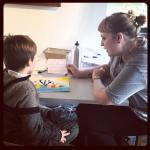
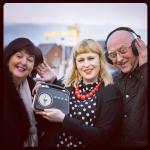




So, here’s the thing. When you have a new book out lots of magazines, newspapers and websites ask if you’d like to write something as a means of promoting your book. Invariably the something they have in mind is not the “2,000 words on Flannery O’Connor’s influence on your writing,” or, “A List of the Top Ten All Time Best Casualty Characters,” you’d really like to talk about at length. It is usually more along the lines of “did you always want to be a writer?” or “what are the best books ever written?” or “what is it like being a woman and also writing?” These pieces are very helpful when it comes to promoting books, (and I am very grateful for all of them), but I now have an increasingly long list of articles I’d really like to write and an ongoing fantasy where editors email me, saying, “hey do you know that essay about Brexit/Borders/Protestant identity we asked you to write? Well, forget it. What would you really like to write about instead?” “WELL….” I say, (in the ongoing fantasy), “it’s funny you should ask that.” This fantasy scenario is never going to happen. So I have decided that I’ll just use my blog to post some of the articles I wish someone would commission before I forget what I want to write about. Who knows, maybe Granta or The Guardian, (Ballymena or regular version), will stumble across this blog at the very moment they’re in need of an article about old people/Presbyterianism/medical dramas.
Today marks my two year anniversary as a Freelancer. Last year I wrote a very detailed report about the year after I handed in my notice. You can read it here. It took a very long time to write and I’m not sure anyone read it. Basically, this year has been roughly the same as last year, except I wrote three books, published one, made my first documentary for Radio 4, my first piece of TV for BBC 3, went to India, got damp in my bedroom ceiling and lumbered with an enormous tax bill. Oh, and the side fell off my bath and my car broke down and cost an arm and a leg to fix. But, I also got awarded two residencies and a research grant. I have collaborated with no string quartets this year. Swings and roundabouts. On the whole, I’d say being a freelance writer and community arts facilitator is still about a hundred times better than working for the City Council. Instead of writing up a detailed end of year report I thought today would be a good day to muse on a topic I was hoping I’d eventually get to write an article about.
As many of you know, (see note on roof damp and broken car above), I am not yet able to exist on the profits gleaned from writing books. Instead, like most writers who are not James Patterson, I continuously juggle writing and another job. I’m not going to say I have a second job, or a job which supports my writing. I’m just going to say I have another job, because I don’t view my community arts practice as secondary or even subsidiary. It doesn’t support my writing, my finance are an almost 50/50 split between writing and community arts practice. I’m not simply doing it until I can afford to be “just a writer.” It’s as important as my writing. It feeds off my creative practice and informs much of what I write. I am often torn between the two pursuits. At different points in the year I’m usually more enamoured with one than the other, (it is a little like my twin affections for Casualty and Holby which tend to fluctuate slightly during dull storylines and when the annual special effects budget has been spent), but, placed under pressure, I honestly couldn’t say which I loved more. I love writing. I love community arts work. I feel unbalanced and increasingly grumpy when I’m not able to do both. (Nb. this article, if commissioned by a newspaper was going to be called “How to be Both” but then someone commissioned me to write an article about having two passports and now that title has been used up so this blog now has a slightly unsatisfactory working title).
I’ve been thinking a lot about frames recently. Last year I read Vona Groarke’s Four Sides Full. It’s an excellent long essay on the role of the frame within art. I was reading it, furiously highlighting sections and mulling over her ideas whilst I wrestled through the edits of my latest novel, The Fire Starters. Groarke writes, “the poem is first framed by silence, and then it is framed by noise.” Most writing sits snugly within a border of white space which helps distinguish what it wants to say from the slightly more pedestrian thoughts and words the world bombards us with. As Groarke says, “if no white space cushioned the poem its language would have to brush up against the language of the world. The world where language buys sausages and fills insurance forms. Where it writes rejections and makes empty promises. Where it speaks in parliament and fudges truth and sells cosmetic surgery and guns. And if there were no white space to mark it off, how would we know the difference? They are only little words. Even the innocent amongst them look like repeat offenders, like the lying sort.” Now, most novelists maintain a reasonably thin boundary between the world and the way they’re trying to record it. It’s the poets who’ve truly mastered the art of white space. However, as I read Vona’s essay whilst working on The Fire Starters, trying to bring the East Belfast I know, love -and occasionally feel like burning down- to life, I began to realise that it was really important this book lost its frame. I wanted to strive for a thin, almost fluid line between the world outside my front doorstep and the world I was writing about. It was at this point that I realised how inseparably linked my writing and my community arts practice actually are.
On the most basic level, I write about the community I facilitate workshops in and live in and write in, (often working out of one of the coffee shops where I actually teach community writing work shops). The line between the people I’m working with and the people I’m writing about is non-existent. I regularly come home from workshops full of little nuggets of ideas based upon stories I’ve been told or snippets of conversation. Writing is such a lonely pursuit and, living by myself, I can go days without talking to anyone but the characters in my head. I think I’d be a much flatter, less believable writer if my community arts practice didn’t drag me out of the house a number of times per week, to be with real people, to interact with them and observe how they interact with each other. During periods in my life where I’ve been writing on retreat, in isolation I’ve missed the spark of human interaction. It’s felt a little like trying to paint from memory as opposed to plonking my canvas in the middle of the market square and capturing the world right in front of me.
I fundamentally believe in the importance of community arts. I believe access to the arts is a right every individual should have. I believe the arts here in Northern Ireland have created neutral spaces where people can come together to explore their differences, respond creatively and try to understand each other. As such, I believe, the arts have played an integral role in the peace process and it is a criminal shame and a very dangerous move to so significantly restrict arts funding. Furthermore, I believe art has the possibility to benefit participants health and well-being. I’ve experienced this time and time again in my own practice with older people and those living with Dementia. However, I also believe art shouldn’t have to have a monetary or ethical raison d’être. Creative practice is a good and worthwhile thing in and of itself. The end often justifies the means, but it shouldn’t necessarily have to. Having said all this, and laid out the creed by which I practice community arts, I must admit that I mostly run workshops and projects and events because I am a deeply selfish person and I get so, so much out of the experience.
My community arts practice grounds me. When you’ve been off gallivanting round the world, reading at book festivals where people you’ve never met are blowing smoke up your ass and talking about your significant contribution to the canon, it is absolutely necessary, (for me anyway), to come home to your own community where people will level with you and tell you what they really think of your work; where your participants don’t differentiate between a Booker shortlisting and getting a “wee piece in the Belfast Telegraph;” where folks bring traybakes to workshops and linger afterwards to chat and talk about real important life issues rather than the naval-gazing nonsense which can sometimes pass for important in literary circles. I’d be constantly fluctuating between having the biggest head in Ireland and giving writing up altogether if I didn’t have my participants to keep reminding me of who I really am.
As well as grounding me, my groups have inspired my creativity. I often collaborate with them on pieces, pushing myself to try new mediums and genres in order to best realise their ideas. Over the last few years in particular, I’ve been inspired by the work I’ve done with people who are living with Dementia to radically rethink my use of language. I’ve become fascinated by the loss of language and the constraints this places on meaning and syntax and have been experimenting with using an Aphasia voice to write short pieces of fiction. You can read a little more about this work in this article I wrote for the British Council, (one of the rare moments when the commission fit perfectly with the article I wanted to write). I would not have stumbled into this area of research if it wasn’t for my community arts practice. It’s not the first time a community project has piqued a new interest in me. I’m guessing it won’t be the last.
Or perhaps it will, because I’m coming to a real crisis point in my arts practice. My writing is taking off. Opportunities I’ve worked really hard to achieve are beginning to open up and it would be daft -and a decision I’d no doubt come to regret- not to pursue all the possible avenues to advance my writing career. However, I sympathise fully with AL Kennedy, who in her fantastic essay collection, On Writing, talks at length about how difficult it was to give up her community arts practice when her writing began to demand so much of her time. I agree with Kennedy in principal. It isn’t fair to mess participants around; to be here for one session and absent for the other when some book festival demands your presence out of town. It would be selfishness on my part to offer people anything less than the best of me and yet sometimes my schedule and traveling, (endless traveling), leaves me more tired and less prepared than I’d like to be, for my classes and workshops. It’s a nice dilemma to find yourself choosing between two things you desperately love doing. It is the opposite of when I was good at both Additional Maths and Art and only had one free option for GCSE subjects. Neither of the options on the table right now are incredibly dull and ultimately pointless.
At the minute, I’m managing to juggle everything. I am very tired and consequently have had a cold for most of 2019. My current workload is a little like spinning plates, if the plates were on fire and every so often someone appeared from the sidelines and handed me another stack of plates and I couldn’t tell which ones were Royal Doulton and which ones were bog standard IKEA. I’m pretty wiped out from all this juggling. And I know the day is coming when I’ll have to phase out much of my community arts practice. And that makes me really sad, because I do want to be both things. I honestly hoped there might be a way to do everything at once. The problem seems to be that I’ve decided to be two things which both have the capacity to consume every waking moment. I should have picked less demanding career options. When I was fourteen I completed a project outlining my ideal future career. Back then I was going to be a part time football commentator/ part time fashion designer. I am wondering if I should revisit this plan.
March 31, 2019
It Takes A Village

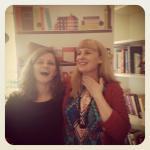
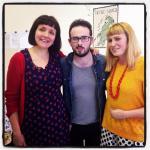
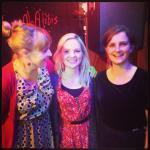
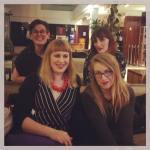
It’s five days until The Fire Starters appears on bookshop shelves and I’m feeling all the emotions: excited, terrified, excited again, mainly just exhausted after a two week dose of the cold which has left me with a peely, red nose and a head so woolly I doubt I’ve made much sense in any of the interviews I’ve done so far. I’ve been in this position a few times before so I’ve some idea of what to expect when launching a book. On Tuesday night there’ll be wine, enough shortbread to sink a small boat, Hannah singing and lots of people I love being happy for me. I’ll be a bit giddy and possibly teary and there will be a moment -somewhere around the fifth or sixth book I sign- when I’ll think, “gosh Jan, you need to get a better signature.” (I really do). I also know that at some point in the evening I’ll make a feeble attempt to thank everyone who’s made this book possible. Inevitably I will forget an important person I really didn’t mean to forget.
They say it takes a village to raise a child. I’ve no interest in raising children but I’m planning on bringing a fair few books into the world over the next few years and I learnt pretty early on that I will not be able to do this alone.* I will continue to rely upon a host of fantastic people to keep the words coming. These people are often so good at enabling and encouraging my writing I don’t even notice what a stellar job they’re doing of keeping me on track. So, I thought I’d take half an hour to compile a list of the people, (or more accurately peoples), who make it possible for me to keep doing what I do. (I’m guessing most writers have their own list of heroes arranged under similar headings).
At least now, when I get overawed and forget to mention someone important on Tuesday night, I won’t feel so dreadful because I’ll know this wee blog exists as a testament to how much I appreciate everything these people have done for me. A huge, big enormous heartfelt thank you to all of you, both the named and the insinuated. I’d buy you all a pint if I could, but I don’t have enough money and some of you don’t drink pints on account of being small children or Presbyterians.
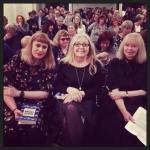

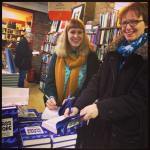


Booksellers – Without booksellers writers wouldn’t sell any books and we’d all end up even more penniless than we already are. In my experience good booksellers, and I am lucky enough to have some truly excellent booksellers in my life, (I’m looking at you Bob in Gutter and Emma and Fiona in Waterstones, and obviously Dave and the brilliant team in the home from home that is No Alibis), do so much more than just sell our books. They champion our work. They encourage us when we’re feeling under appreciated and they continuously broker relationships between us writers and the people who will read our work. They also sometimes give us free wine.
Editors – I have to say I’m not one of those writers who enjoys the editorial process. For me, writing is the fun part of the process, like baking a cake and creating havoc in the kitchen. Editing is sort of like doing the dishes afterwards. All my books would have been utter disasters if it weren’t for the editors who’ve carefully and graciously licked them into shape, curtailing my ludicrous fondness for semi-colons and subsidiary characters. Alice Youell who edited The Fire Starters is the Queen of all the editors. She took a muddle of a manuscript, pulled all the best parts to the surface, brought my characters to life and chopped over ten thousand unnecessary words out so artfully I barely noticed. She is a legend of a woman. She has almost made me enjoy editing. (Nb I said almost. I’m not quite there yet).
Family – I am very fortunate to have a family who are supportive and interested in what I do. I know that some writers can’t say the same and so I’m incredibly appreciative of the people I do have around me. Thank you to Mum, Dad, Alan, Laurie, Caleb and Izzy for all the meals you’ve served me when I haven’t had time to cook, the readings you’ve attended, (especially the really terrible ones back at the start), the boring book festival anecdotes you’ve patiently listened to patiently and even the times when you’ve all ganged up to mock my ludicrous lifestyle choice and say things like, “so what’s this book about then? More flying children?” It’s good to have people who keep me grounded even if it does mean being repeatedly skundered by a ten year old. It is good to know where home is.
Journalists – Not all journalists are brilliant. We’ve all endured our fair share of poorly researched, fluff pieces which say very little about our process or the issues explored in our work. However, there are some very talented journalists and critics currently writing about the Irish art scene and it’s always an incredible privilege to come across their work and realise these, (mostly) strangers have invested time and thought in trying to understand my stories. Even a negative review, well-written and researched is a gift to a writer and it’s not unusual for me to better understand my own work once a critical reader has begun to unpick and explore the themes contained in it. To avoid the issues which come with reviewing friends and colleagues’ work, we desperately need to develop more arts journalists and critics, especially in the North. However, this shouldn’t stop us being very grateful for the great ones we already have.
Academics – Similarly, I’d like to acknowledge the incredible amount of work currently being done by those academics who are carrying out research and writing about our work. Over the last few years there seems to have been a real rise of incredible, (mostly young, and mostly female), academics casting much needed light on the writing come out of Northern Ireland. I’ve thoroughly appreciated both the opportunities they’ve opened up for me in terms of being read critically within academia, and also the fresh insight it’s brought into the themes I explore in my work. Special mention must go to Caroline Magennis, Dawn Sherratt-Bado, Marianna Gula, Hedwig Schwall and the incredible support offered by EFACIS and the community of academics within the world of Irish Studies.
Agents – I didn’t have a literary agent for my first three books. Now, I have Kate Johnson and I know for certain I couldn’t go back to being on my own again. I don’t know whether every agent in the world is a great as Kate; maybe they are; maybe I just lucked out. Kate is so incredibly professional. She goes out to bat for me and my writing at every turn and it finally feels like I’m not an individual struggling to be heard so much as part of a really strong team. Not only has Kate found a perfect publishing home for my books, she’s also provided encouragement, stellar book recommendations, a listening ear when I’m feeling confused or discouraged, a friendly face at important meetings and readings AND she remains the only person I know who always responds to emails within twenty four hours. She is, quite simply, the best. For me, it’s incredibly important that the person representing me does so with complete integrity. I need to be able to trust them to convey the values and issues which are an essential part of both my writing and who I am. Kate consistently does this. I honestly don’t know how I managed before her.
Publishers – Good publishers are absolutely integral to the book industry. I’ve had previous experience of both great publishers and not so great publishers and I want to thank Fiona Murphy, Patricia McVeigh, Hannah Bright and the team at DoubleDay for doing such an incredibly good job of looking after me and my book. Releasing a book to a publisher is a bit like dropping off your kid at school on its first day. You really want the publisher to appreciate the best bits of what you’ve created, do their best to improve the parts that need improving and basically love what you’ve made as much as you do. Mission accomplished DoubleDay women. You’ve done the most amazing job of being absolute powerhouses of professionalism and also warm, approachable and available. I’m so thankful to be working with you and excited about what comes next for all of us.
Friends – This will be a short one. I’m always harping on about how much I rely on the arts community in Belfast. I’d be a puddle without these people. You know who you are. You’re mostly women, wearing comfortable shoes, striding purposefully about the city, actually getting things done. I’d add to this list a bunch of amazing Irish writers and literary professionals throughout the UK and beyond who’ve become good friends over the last few years. It’s all very well talking to your brother or the barista in your favourite coffee shop when things are going well writing wise, but when you’re rock bottom, struggling to get to the end of a chapter or facing a pile of rejection emails, nobody’s quite as good at empathising as arts friends. You lot are the best.
Readers – Curious readers. Reluctant readers. Appreciative readers. Readers who buy the book and don’t get round to reading it until you’re publishing the follow up. Fast readers. Readers who never get past the third chapter. Hardback, buy it the day it comes out readers and, (it kind of pains me to say this), Kindle readers. Readers who track you down to tell you how much they enjoyed the book. Readers who track you down to tell you how much they didn’t enjoy the book. We need all the readers. If we don’t have readers there’s very little point in writing books and so I am thankful for all my readers, though I’m maybe not quite as thankful for the ones that track me down to moan.**
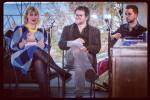

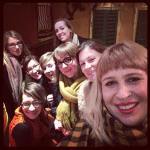
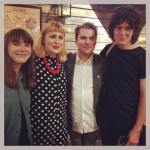

*I did once have a woman come up to me after a reading to tell me I was wasting money publishing books through a publisher. I should follow her lead and photocopy my books on the work photocopier and then sell them at car boot sales. So, I guess it is technically possible to go it alone as a writer, though now I’m self-employed I no longer have a work photocopier upon which to clandestinely photocopy my novel.
** I am also struggling to find any thankfulness in my heart for the woman who came up after a reading with a secondhand copy of my book, already signed to someone else. “Can you put a line through that name and sign it to me,” she said and went on to explain that she’d purchased her copy in Oxfam books because she’d read the first page in Waterstones and didn’t think it was really her thing, so she wasn’t going to pay full price for it.
February 24, 2019
The Fire Starters Belfast and Dublin Launches
Just in case there are any of you reading this blog who I’ve missed, I wanted to let you know I have a new novel, The Fire Starters launching on Tuesday April 2nd at the Crescent Arts Centre in Belfast. The launch will include a short reading, some music from the phenomenal singer songwriter Hannah McPhillimy, an introduction from Damian Smyth of Arts Council NI, themed shortbread and other shenanigans.
The Dublin launch will be in Gutter Books on Tuesday April 9th and I’m delighted that Roisin O’Donnell, who’s a great friend and fantastic writer, has offered to say a few words of introduction. I’d love it if you were free to celebrate with me on one of these evenings. I’m hoping to have some further reading dates in the UK to tell you about soon.
We’ll be kicking off at 6:30pm and should be finished by 8pm. Everyone is welcome so feel free to pass the invite on. If you’re planning on coming along it would be really helpful if you could send a wee RSVP to areddie@penguinrandomhouse.ie so we can be sure we have enough shortbread. Looking forward to seeing you. Jan
February 10, 2019
Postcard Stories From London and Brighton





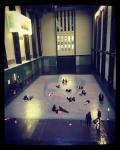
Keith Martin
Tate Modern, London
7thFebruary 2019
Perhaps it wasn’t the best idea to take a three year old to an art museum. Perhaps another three year old might have taken the Tate Modern in his stride. But Archie was overtired this afternoon and hungering for his dinner and -even on a good day- was not the best behaved toddler in London town. So, it was hardly surprising that when Archie arrived in the darkened room containing Cildo Meireles Babel sculpture, he did not appreciate its gibbering subtlety, or take time to pace its circumference, or even recognise it as a piece of art. No, Archie saw the sculpture for what it was: an enormous tower of radios piles one on top of the other, like a giant, tapering bonfire, lights flickering erratically, dials glowing, every radio set to different stations with no particular voice perceivable above the din of voices clamouring for his attention, (though it should be noted that the most eagle-eared of the gallery attendants would swear they can always hear Phil Collins’ Easy Lover, rising above the racket). So, it is hardly surprising that Archie -sleep-deprived as he was and hypnotised by so much noise, and so many lights, crammed together in such a small space- should reach for the closest radio to hand and, in doing so, topple Babel for a second time.
Alice Leader
Brighton
8thFebruary 2019
If ever there was an evening for a gentile, English murder, it is this evening, in Brighton. The rain is coming down in tides. The sea is slate gray and peaks, like white-tipped meringues, all around the pier’s feet. The taxi drivers at the train station look positively murderous. Everything -the Victorian promenade, the bandstand, the Art Deco doors on the elevator- is lifted from a Poirot adaptation. Surely, there will be a body discovered in the library before breakfast. You are terribly keen on a body being discovered in the library. You fantasise about solving the mystery of the body in the library using a combination of intuitive cunning and detective knowledge acquired from a lifetime’s devotion to Dame Agatha Christie. When checking in you make a point of telling the receptionist to let you know if there’s a murder -any kind of violent death, really-during the night.
“I’m in Room 311,” you say, “just in case someone is murdered and some help sorting everything out.”
The receptionist looks confused.
“This looks like the kind of hotel where a murder might take place,” you explain.
The receptionist looks horrified. You do not understand why. Perhaps she has never seen a Poirot adaptation before. The penny does not drop until you are half way to the third floor in the Art Deco elevator. This is not the best hotel in Brighton to be discussing murder in a Northern Irish accent.
Tania James
Brighton
9thFebruary 2019
During the course of consuming a single slice of cake -albeit an enormous edge of a thing, covered in chocolate fondant- three individual postage vans pass by the bakery window. The third van bears the same golden crown insignia as the previous two, but the words Royal Mail have been translated into Welsh. “Post Brenhinol,” you read aloud, and because neither of us speaks anything but English and a smidgen of High School French, run these words through Google translate to confirm our suspicions. We then spend a second slice of cake, (lemon and poppy seed drizzle), speculating on what might have brought this Welsh postman, (or postwoman, you point out), so far from home. We Google again and discover it is almost 200 miles from Cardiff to Brighton and who’s to say the driver doesn’t hail from proper, far away Wales, (Conway or Llandudno, I suggest, having holidayed there as a child). “Perhaps it’s a special delivery of something specifically Welsh which they have need of here, in Brighton,” you suggest. We speculate again and make a list which includes leeks, dragons and Tom Jones, (the singer rather than the fictional character). More likely the Welsh postman is just on a weekend minibreak. Like us, he is no doubt questioning the sense of visiting a Victorian seaside resort in February, on the stormiest day of the winter.
Sohaila Abdulali
Brighton
10thFebruary 2019
The Mexican artist Frida Kahlo has come back from the dead to enjoy a midwinter break in the English seaside resort of Brighton. It is colder than she’d anticipated, and raining, but Frida is of a sunny disposition and remains determined to make the most of her three days eating fish and chips, visiting the amusement arcade of the pier and purchasing sticks of Brighton rock for all her dead artist friends. Mini-breaking in Brighton, even on a cold February morning, is much better than being dead. Frida reminds herself of this every time she notices the drizzles is wrecking havoc on her signature hairdo. Frida Kahlo is walking past a giftshop when she first notices her own likeness adorning a notebook. Later she will come across candles, socks, ballpoint pens and shot glasses all decorated with a portrait of her face. She will wonder why she is so popular here, with these English people. Only cats and David Bowie appear to be more popular than her. Frida Kahlo is not from Brighton originally. She has never visited the town and, until very recently, could not even have told you where Brighton was, (though she’d know enough to associate it with the sea). Frida Kahlo is amused by her own popularity. She purchases a pin badge of her face. It is printed round the edges with the words “Frida Forever.” She will give it to one of her dead artist friends once she gets home; Picasso most likely, for he is easily amused. When she buys the pin badge the girl at the till says, “nice outfit- you look just like her,” and Frida makes a point of saying, “thanks” rather than, “gracias.” “Gracias,” might seem like she is trying too hard.
January 31, 2019
Some Thoughts on Jaipur

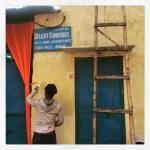




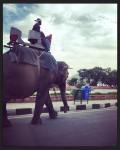
Every time I spend an extended period of time at a literary festival the same thing happens. It’s a little like being at summer camp. I start the week knowing no one and by the end of the week, after living in each others’ pockets for seven straight days, have become completely dependent upon a bunch of the most amazing stranger friends I’ve ever met. Then the festival ends and I leave these people behind. I swap email addresses and say my goodbyes. I get on a plane or bus or train and travel back to my regular friends and my actual family. I try to explain what I’ve just experienced. I tell anecdotes and recount conversations which make little sense out of context. I refer to people the folks at home have never met. I miss my festival friends something shocking. They -I tell myself- are the only ones who can properly understand what I’ve experienced. I feel as if am straddling two different worlds. I’ve left one place, but not quite arrived in the next place yet. It takes anything between two days and a week for this strange in-between state to wear off. It is, in some ways, comparable to jet lag, but it’s harder to explain to the 99% of the population who don’t spend half their year hanging out in strange cities with complete strangers.
I spent last week in Jaipur, India at one of the Worlds’ largest literary festivals. It was my first time in India and though several people warned me I’d be overwhelmed by the Indian culture, it still managed to defy all my expectations. Jaipur was overwhelming and wonderful and terrifying and exhilarating and inspiring and exhausting and just about every other adjective you can think of, all at once, very loudly, without respite. I arrived home late on Monday night. I was glad to be home. I’m always grateful to have a community I want to return to, and it has been nice to feel like I’m not taking my life in my hands every time I step into a moving vehicle and, delicious as the Indian food was, I’m quite happy to be eating non-lentil based meals for the foreseeable. (Never been more thankful to sink my teeth into a bog standard chicken sandwich). However, I’m missing my festival friends more than ever. A little part of me wishes to be around people who understand how disconcerting an experience like Jaipur can be. I don’t know how to say exactly what I’m feeling.
This week as I’ve walked round East Belfast in the biting cold I’ve been trying to process my week away. I think I will be mulling over it for some time to come. When people ask me how India was I say something along the lines of, “amazing and overwhelming, in equal measure,” and this does not even begin to scratch the surface of how much the last week has impacted me. I find myself recounting anecdotes as metaphors for the bigger realisations I’m not quite ready to put into words. The afternoon a tree fell on four people in the dining area. The man sat next to me at a discussion on Nordic politics, merrily chomping on a whole head of broccoli as if it were a Granny Smith. The audacity of Germaine Greer, sitting in front of several thousand Indian women, questioning the insidiousness of rape. A dozen or so A List writers crammed onto a rickety coach, careering down a mountainside in the pitch black. The man who stood at the back of one of my readings cooking chips in a deep fat frier because the event was sponsored by McCains. The moment the other writers on my panel began speaking in Hindi, leaving me unable to understand anything being said. The moment which directly followed this moment when I looked up and realised I was the only non-Indian in a room of about a hundred people, and therefore had absolutely no grounds for feeling so pissed about their choice of language.
Each of these anecdotes says something about India I’ve not yet managed to distill into an actual sentiment. The next time someone asks me about Jaipur I’d like to be able to say something profound and well-considered about how the experience had impacted me, but the whole things was so muddy and complex I haven’t been able to untangle my thoughts yet. I can only offer thin anecdotes about babysitting Ruby Wax and becoming trapped in a vibrating chair and near death taxi rides. Ask me again in a few weeks time when I’ve settled back into myself. I hope to have drawn some conclusions by then. I’d like to know exactly what sort of undoing I’ve been muddling through.
On the most basic level, I have to say that it was an incredible privilege to read my work alongside established writers from all over the world, and I made some fantastic connections, and met a bunch of incredibly interesting, warm and gracious people, (and a few complete wankers too), and Jaipur was one of the most stunning, vibrant cities I’ve ever visited, and man alive, the cocktail parties were stupendous, like Gatsby on speed. On a more complex level I’m not quite sure how to explain how small I felt surrounded by so very many people all crammed together in one city, or the low-level hum of guilt which is impossible to shake off when walking the line between incredible opulence and heartbreaking poverty, the class politics which are ever-present, the way the legacy of Colonialism constantly forced me to deconstruct my own sense of identity, the food, the noise, the elegant, elegant people, the crippling shame of realising how very little I know about writers and artists who work -incredibly successfully- outside my own Western-centric arena of experience, all the disposable plastic water bottles I drunk from and discarded over a seven day period, the sheer physical graft of maintaining a sociable facade with so many people for such a long time.
Nothing about India is simple or easy to understand. It’s a complex, excessive, intriguing kind of place and tonight, while typing these thoughts up, I find myself both desperate to return as soon as possible and keen to avoid setting foot in the place ever again. Reintegrating into the real world after a festival is never easy. I always feel a little out at sea when I get back home. But I can’t remember a time when I’ve missed my festival buddies more. It’d be a kind of cheap therapy to talk to another equally discombobulated soul right now.



